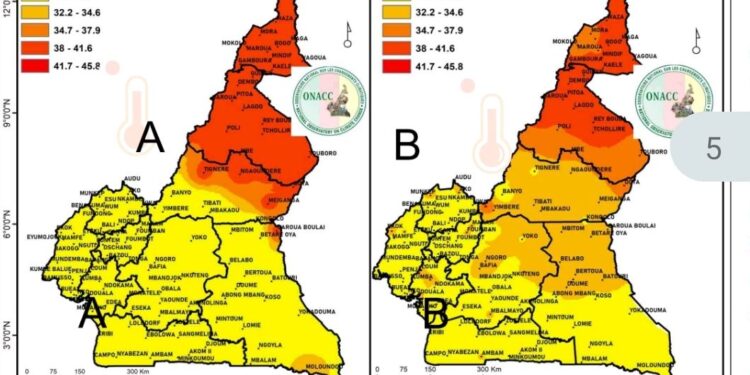The National Observatory on Climate Change (ONACC) has warned of significant health risks and agricultural conflicts due to extreme temperatures and shifting weather patterns between March 11 and March 20, 2025.
Rising Temperatures Pose Health Risks
The report indicates that most of Cameroon will experience hotter-than-usual conditions, with maximum temperatures ranging between 35°C and 40°C in the Far North and North regions, 34°C and 37°C in the Adamawa region, and 30°C and 35°C in the Centre, East, South, and Littoral regions.
Nights will also remain warm, particularly in the southern coastal regions and parts of the Far North, where temperatures will not drop below 22°C.
According to ONACC, these high temperatures increase the risk of several health conditions, including a surge in malaria cases in the southern regions, where increased rainfall will create more breeding grounds for mosquitoes.
The institution also predicted a rise in respiratory illnesses due to dust particles in the air, particularly in the Sudano-Sahelian zone (Far North and North regions) and the Guinea High Savannah (Adamawa region).
ONACC also sees a high risk of meningitis outbreaks in the Far North due to extreme heat and dry harmattan winds from the Sahara.
Thermal discomfort and heat stress, especially in urban centers like Yaoundé, Douala, Bertoua, and Kribi, where rising temperatures, coupled with pollution and heavy traffic, could pose severe health risks fo, pregnant women, and those with chronic conditions like diabetes and hypertension.
The report urges authorities to enhance awareness campaigns on malaria prevention, hydration, and respiratory disease management while strengthening healthcare facilities in the most vulnerable regions.
Agricultural Conflicts Expected to Rise
The changing climate is also expected to exacerbate tensions between farmers and livestock breeders, particularly in the Far North region, where water and grazing land are becoming scarcer.
The ONACC report highlights the following concerns: Increased farmer-herder conflicts over access to water and pastureland, especially in the Logone and Chari area and the Mandara Mountains.
Higher risks of animal losses due to extreme heat and sudden temperature variations, particularly in the Far North, North, Centre, South, East, and Adamawa regions.
Lightning strikes could kill livestock in the highlands of the North West region as the rainy season sets in.
ONACC advised authori to lestablish mediation frameworks between herders and farmers to reduce disputes and provide alternative water sources for livestock.
Additionally, livestock breeders are encouraged to ensure proper hydration and shelter for their animals to prevent losses due to heat stress.
Recommendations for Mitigation
To address these pressing issues, ONACC recommends:
Strengthening disease surveillance to quickly respond to malaria, meningitis, and respiratory illnesses.
Encouraging sustainable water and pastureland management to prevent farmer-herder conflicts.
Developing urban planning policies that incorporate green spaces to reduce heat stress in cities.
Enhancing veterinary services to protect livestock from heat-related diseases.
With extreme weather conditions becoming more frequent, ONACC stresses the urgency of proactive measures to safeguard public health and ensure stability in the agricultural sector.



